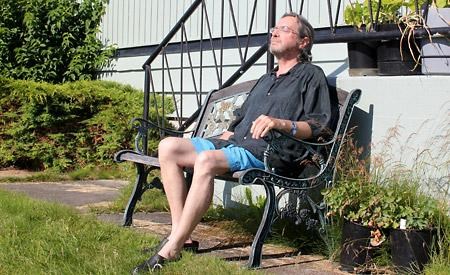Powell River saved Don Skonberg’s life. A small wooden flip calendar with a wooden frog perched on it marks the date when Skonberg became deathly ill—June 14, 2011. Skonberg now sees it as the day his life truly began.
“If I was still in the city,” Skonberg said, “I would have died.”
Skonberg, a 60-year-old who lives for music and sound, moved to Powell River with his wife two and a half years ago looking for an escape from the Lower Mainland. After living in North Vancouver for 25 years, Skonberg was done with city life.
“The city was too noisy for me,” he said, explaining how the constant car alarms and sirens forced him to wear ear plugs. “Now I can hear the ocean at night. It’s wonderful, so peaceful.”
Though he loves his new home now, Skonberg didn’t always look on Powell River with such fond eyes. When he worked in the sound business, occasionally touring through the city with bands or dance troupes, he was turned off by the mill smell. “We just came in, did our gigs and left town,” he said.
Skonberg explained that as a young man, he just wanted to move to the city and escape small towns where he had spent his childhood. Yet, as he has grown older, smaller communities have grown on him. “They’re a lot better than you think as a kid,” he explained. Now, he laughed, it’s the city that stinks.
Another selling factor for smaller communities, Skonberg said, is the friendliness of their residents. “People say ‘hi’ to you when you’re going by,” he explained. “In the city, they’re looking at you strange if you’re smiling.”
This friendliness leads to, or maybe comes from, a sense of community. He commended events such as International Choral Kathaumixw, which bring the town together. This kind of community involvement, he said, does everything from fostering public interaction to lowering crime rates.
Skonberg also has another reason to be thankful for Powell River—its hospital. “It’s very professional, very good,” he said. Skonberg should know. In 2011, medication for his diabetes caused a deadly allergic reaction in his body that all but destroyed his kidney function. Called end-stage nephritis, the condition had him vomiting up anything he tried to eat.
“The hospital here, they saved my life,” said Skonberg. If the hospital hadn’t dealt with him right away, he said, which would have been unlikely in a crowded city emergency room, he probably would have died.
But Powell River had even more to offer the ailing 60-year-old. Skonberg described riding the bus to the hospital one day after his initial diagnosis. Too weak to comb his hair or walk without a cane, Skonberg was sporting what he called a beard gone wild.
He then described how a boy, no more than 10, sat down in front of him, turned around and said, “You’re new in town, aren’t you?” After answering yes, the boy “sticks his little hand out...and says, ‘Welcome to Powell River!’ I wasn’t an approachable person to anybody,” said Skonberg, “especially a shiny 10-year-old.”
Skonberg continued that the friendliness the people of Powell River have to offer, without any kind of pretense, is priceless.
These days Skonberg uses a dialysis machine every night, but he still tries to walk into town and back every afternoon, meeting friends both old and new along the way. That, he said, is his favourite part of the community. “Here, people you don’t know are just a friend you haven’t met yet.”
This article is the start to a series called Open Arms, focusing on the experiences of new residents in Powell River. Any reader who has a welcoming experience they would like to share can email [email protected].



